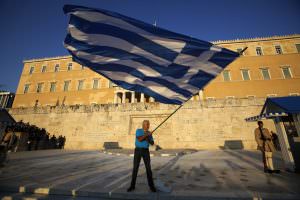Greek Unrest the Result of Suppressed Democracy
Denied a referendum on crippling austerity measures, Greeks demonstrated Sunday night that if they couldn't express their opinions one way, then they would do it in another.
When the first international effort to impose an economic austerity regime upon Greece was completed, George Papandreou, the prime minister, surprised and infuriated the negotiators from the IMF, European Commission and European Central Bank by proposing that the draft agreement be submitted to a popular referendum in Greece. The negotiators and their governments knew very well that the Greek people would reject it.
Mr. Papandreou was hustled out of the limelight, and foreign leaders, the EU, international financial officials, and right-thinking commentators in Europe and the United States all deplored his proposal, since democracy was not part of the deal.
If it had been, some 45 buildings would not have burned in Athens last Sunday night, and some hundred thousand or so Greeks would not have taken to the streets, smashing the marble walls of banks and shop windows. If they couldn’t express their opinions one way, then they would do it in another.
This gives reason to doubt that the international austerity plan, or the Diktat, as the Greeks prefer to call it, which was presented in Athens and reluctantly voted on, will actually be carried out. (The vote was 199 members of the National Assembly in favor, 74 opposed, with 27 abstentions.) A failure to enact the plan will have the disastrous consequences for Europe, the monetary union and Greece that nearly all have predicted. The figures are such that, of the money now promised Greece (assuming the EU’s other national parliaments approve), three-quarters will go to pay current debts. What remains is unlikely to stave off national bankruptcy this spring, and probably Greek exclusion from the euro zone. So what has it all been about?
Among Greeks, the opinion is widespread that once again, as in 1917, 1940 and 1947, when, as they are convinced, they were ill-used by the great Western powers, they once again are victims of Western Europe, and especially of Germany. They cannot deny the reproaches of economic mismanagement and corruption since their country joined the EU, but they did not need a German official to propose that an EU-appointed commissioner, whom angry Greeks are calling a German gauleiter, be sent to take charge of Greece’s economy — which, after all, is only 2 percent of the European economy. Another German was overheard confiding to a Portuguese official that if Portugal, also in grave difficulties, needs help, there would be no trouble providing it — implying that a certain “racial” hierarchy prevails in European and international economic circles.
The French Socialist Party’s candidate in this spring’s presidential campaign, Francois Hollande (who the polls currently say has a large lead over President Nicholas Sarkozy), told the newspaper Le Monde on Monday that if elected he would demand renegotiation of the budget discipline treaty agreed upon by the EU’s members in Brussels on Jan. 30, particularly concerning its sanctions, and the role given to the European Union Court of Justice.
He told the foreign press that “everybody knows there is no rebound of growth in Europe or in Greece, and that Greece will never reach the results” set for it by the weekend negotiations. What is being forced upon Greece, Mr. Hollande said, is “a purge.” Greece’s situation, he said, has been the result of a failure in Greek governance, but also is “a failure of European governance.”
His argument is that the austerity program (and every other delinquent loan in Europe) makes growth impossible. “Who is paying taxes today in Greece? It’s a real question. The wealthiest people — there are plenty in Greece — have taken to their escape boats; they’ve left. And the poorest people are in the underground economy.”
He did not go into the question of ultimate responsibility for this international economic debacle, which might have led to accusations of anti-Americanism. Crime on Wall Street is a culprit, obviously, but so is the economic doctrine that has dominated the international economy since the 1970s, monetarism, the basis of the so-called “Washington Consensus,” to which the U.S. Treasury, the IMF, the World Bank, the German Finance Ministry and the European Central Bank are all committed.
As neo-Keynesians have pointed out, the monetarists’ fundamental principle that markets automatically seek equilibrium and are therefore self-regulating (that labor markets, for example, always operate so as to move the economy toward full employment) is not true in Greece’s circumstances. Therefore, the European and IMF plan is to force them to recover a roughly 40 percent disadvantage in competitiveness (compared with Germany) through imposed austerity.
George Papandreou understood that the people had to be asked — democratically — to make such a sacrifice. The other Europeans and the international agencies thought otherwise. No wonder the Greeks are angry.
Visit William Pfaff’s website for more on his latest book, “The Irony of Manifest Destiny: The Tragedy of America’s Foreign Policy” (Walker & Co., $25), at www.williampfaff.com.
© 2012 Tribune Media Services, Inc.
Your support matters…Independent journalism is under threat and overshadowed by heavily funded mainstream media.
You can help level the playing field. Become a member.
Your tax-deductible contribution keeps us digging beneath the headlines to give you thought-provoking, investigative reporting and analysis that unearths what's really happening- without compromise.
Give today to support our courageous, independent journalists.



You need to be a supporter to comment.
There are currently no responses to this article.
Be the first to respond.